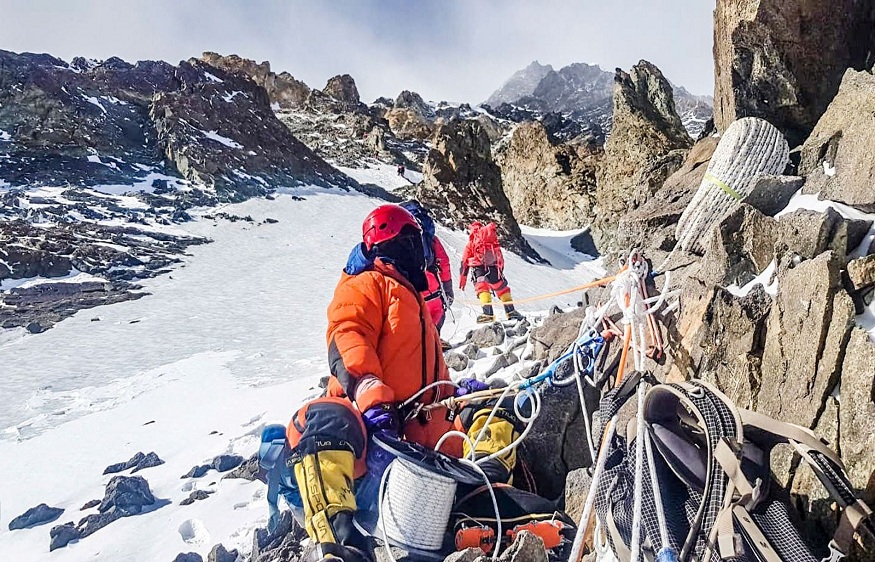I moved to Grenoble in the summer of 2021 with the fierce desire to crunch the mountains in all seasons. But I’m also concerned about doing it responsibly. So I asked myself the following question: are there eco-responsible ski resorts? or ways to limit my footprint during a stay in the mountains in winter. That’s what I’m going to find out in this podcast episode. You can view this content in audio format using the player below or by reading this article.
To answer it, I shared the microphone with several guests. The first is Guillaume Cromer, director of ID tourisme , a consulting firm on sustainable tourism development. He works in particular with local authorities and tourist offices. He is also part of a think tank called 2TM (Transition Territoires Montagne) . He was also long-time president of ATD, Actors of Sustainable Tourism . In short, you will have understood that he is a committed and passionate person on the subject.
An issue that weighs mainly on carbon emissions
You wouldn’t necessarily think so at first glance, but 80% of a ski resort’s carbon emissions come from the transport of travelers who go there either because they use the car or because foreign travelers take the plane.
As a traveler concerned about his footprint, the first action to implement is therefore to promote less carbon-intensive modes of transport. Here are some leads:
When the resort is only accessible by car, encourage carpooling
If you are brave and nearby, the best is to go there by bike (but we agree that it is not the easiest)
Even if it is not easy to find your way around in the routes or timetables of trains and coaches, if you search carefully, you will find many stations accessible by public transport. Depending on the season, shuttles can be set up by the resorts to limit the number of cars. I give you plenty of examples at the end of this article.
Some resorts also encourage the arrival of travelers in soft mobility. This is the case of Arêches-Beaufort which offers preferential rates for those who come by carpooling. The more people there are in the car, the lower the price. Several resorts of the Labelle Montagne group (Orcières Merlette, Praz sur Arly, Risoul, etc.) also promote this carpooling by offering discounts.
The question of accommodation and heating
After transport, the issue of accommodation and heating comes second. As responsible travellers, we should therefore try to find eco-responsible accommodation in the mountains, but it is not always easy.
To help you, I suggest you listen to my specific episode on sustainable accommodations and the different platforms that make it easier to find them.
What is the weight of the development of ski areas?
Contrary to what I might have thought, the question of the specific facilities of the resorts, namely the lifts, snow cannons only come in third place in terms of ecological issues. From a carbon point of view, they are not the most problematic. However, this does not mean that there are not other issues behind such as water sharing, the use of electricity from nuclear power, the visual impact or the disturbance of wildlife.
To deepen the subject on ecological issues, Guillaume Cromer invites us to listen to the episode of the podcast “the Greenletter” on the theme “Can we still ski in 2100? where Loïc Giaccone , specialist in issues related to mountains and climate transition, gives us his analysis.
Then, even if these installations do not consume so much, they also condition our way of apprehending and experiencing the mountains. Until recently, the mountains, winter, rhymed with only one activity: skiing. When we have to make profitable investments as important as those of the ski lifts, we can understand that the development is only done through this prism.
skiing in orcières merlette 1850
But with global warming, changes in travel habits (linked to the coronavirus crisis) and many other factors, skiing could lose an important place regardless of those who keep it alive today.
Resorts did not wait for this decline in skiing to start diversifying their activities today. As Guillaume Cromer reminds us, even if the ski industry is more lucrative than other activities, we have to look at who benefits financially. On closer analysis, a community has as many or similar fallout over different seasons. The same cannot be said for ski area management.
Diversification therefore generates multiple debates among mountain stakeholders because depending on the models chosen, the winners are not the same. I hope it will be able to meet the challenges of the resorts and allow people who live in the mountains to be able to stay there.

